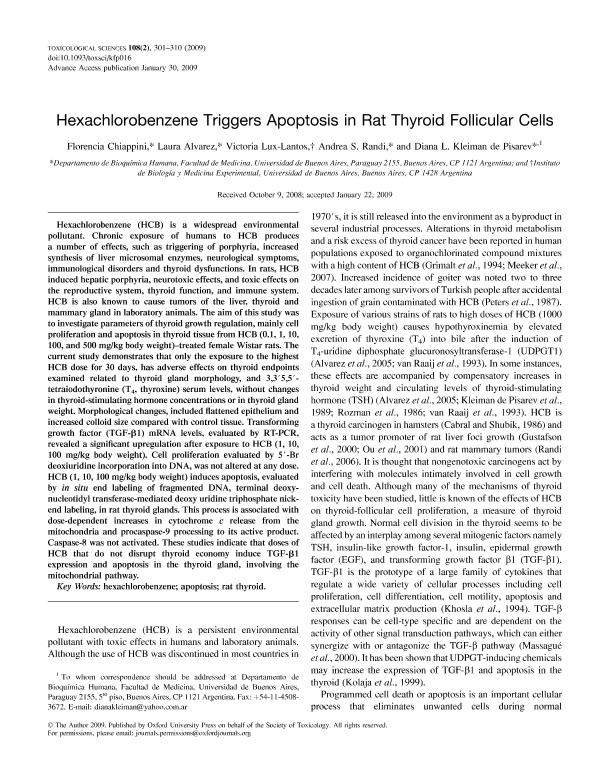Artículo
Hexachlorobenzene triggers apoptosis in rat thyroid follicular cells
Chiappini, Florencia Ana ; Alvarez, Laura
; Alvarez, Laura ; Lux, Victoria Adela R.
; Lux, Victoria Adela R. ; Randi, Andrea Silvana
; Randi, Andrea Silvana ; Kleiman, Diana Leonor
; Kleiman, Diana Leonor
 ; Alvarez, Laura
; Alvarez, Laura ; Lux, Victoria Adela R.
; Lux, Victoria Adela R. ; Randi, Andrea Silvana
; Randi, Andrea Silvana ; Kleiman, Diana Leonor
; Kleiman, Diana Leonor
Fecha de publicación:
04/2009
Editorial:
Oxford University Press
Revista:
Toxicological Sciences
ISSN:
1096-6080
e-ISSN:
1096-0929
Idioma:
Inglés
Tipo de recurso:
Artículo publicado
Clasificación temática:
Resumen
Hexachlorobenzene (HCB) is a widespread environmental pollutant. Chronic exposure of humans to HCB produces a number of effects, such as triggering of porphyria, increased synthesis of liver microsomal enzymes, neurological symptoms, immunological disorders and thyroid dysfunctions. In rats HCB induced hepatic porphyria, neurotoxic effects and toxic effects on the reproductive system, thyroid function and immune system. HCB is also known to cause tumors of the liver, thyroid and mammary gland in laboratory animals. The aim of this study was to investigate parameters of thyroid growth regulation, mainly cell proliferation and apoptosis in thyroid tissue from HCB (0.1, 1, 10, 100, and 500 mg/kg body weight)-treated female Wistar rats. The current study demonstrates that only the exposure to the highest HCB dose for 30 days, has adverse effects on thyroid endpoints examined related to thyroid gland morphology, and 3,3´,5,5´-tetraiodothyronine (T(4,) thyroxine) serum levels, without changes in TSH concentrations or in thyroid gland weight. Morphological changes, included flattened epithelium and increased colloid size compared with control tissue. Transforming growth factor (TGF-beta1) mRNA levels, evaluated by RT-PCR, revealed a significant upregulation after exposure to HCB (1, 10, 100 mg/kg body weight). Cell proliferation evaluated by 5´-Br deoxiuridine (BrdU) incorporation into DNA, was not altered at any dose. HCB (1, 10, 100 mg/kg body weight) induces apoptosis, evaluated by in situ end-labeling of fragmented DNA, TUNEL, in rat thyroid glands. This process is associated with dose-dependent increases in cytochrome c release from the mitochondria and procaspase-9 processing to its active product. Caspase-8 was not activated. These studies indicate that doses of HCB that do not disrupt thyroid economy induce TGF-beta1 expression and apoptosis in the thyroid gland, involving the mitochondrial pathway.
Palabras clave:
Hexachlorobenzene
,
Thyroid
,
Apoptosis
,
Mitochondria
Archivos asociados
Licencia
Identificadores
Colecciones
Articulos(IBYME)
Articulos de INST.DE BIOLOGIA Y MEDICINA EXPERIMENTAL (I)
Articulos de INST.DE BIOLOGIA Y MEDICINA EXPERIMENTAL (I)
Articulos(OCA HOUSSAY)
Articulos de OFICINA DE COORDINACION ADMINISTRATIVA HOUSSAY
Articulos de OFICINA DE COORDINACION ADMINISTRATIVA HOUSSAY
Citación
Chiappini, Florencia Ana; Alvarez, Laura; Lux, Victoria Adela R.; Randi, Andrea Silvana; Kleiman, Diana Leonor; Hexachlorobenzene triggers apoptosis in rat thyroid follicular cells; Oxford University Press; Toxicological Sciences; 108; 2; 4-2009; 301-310
Compartir
Altmétricas



